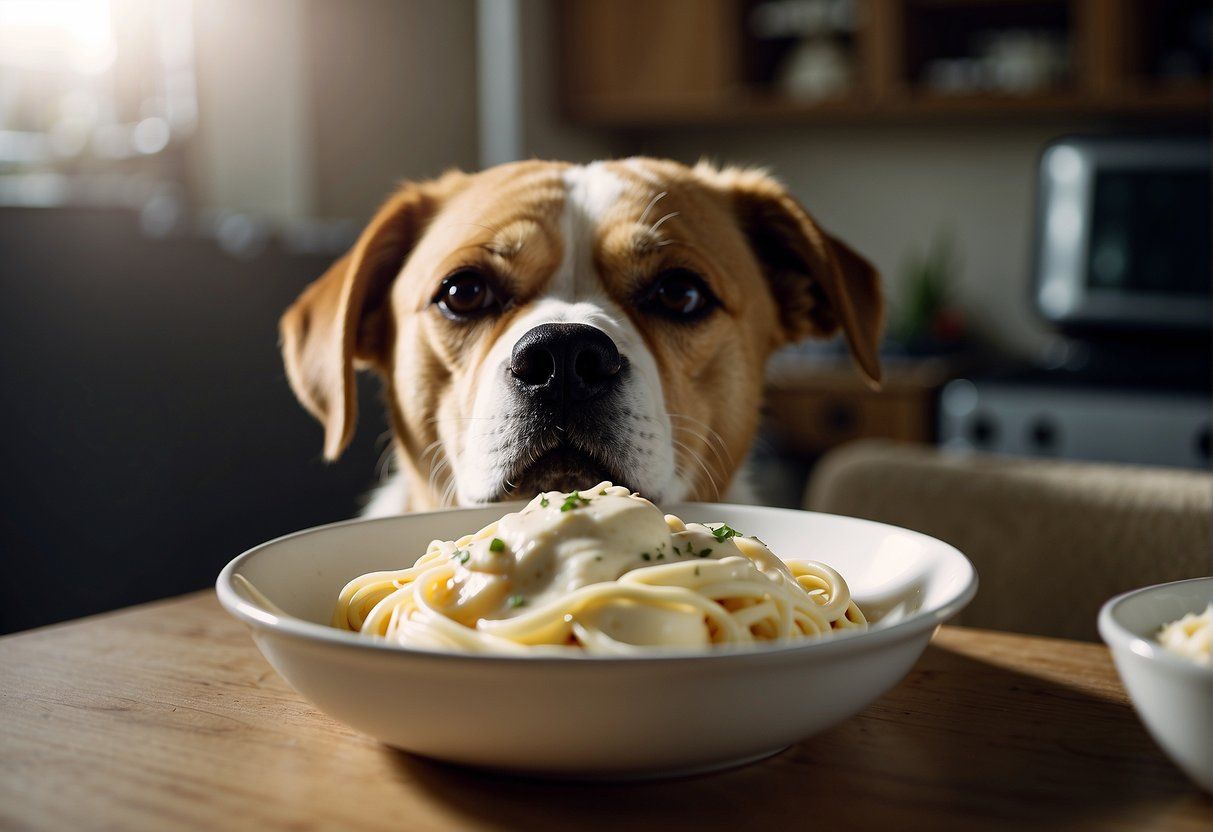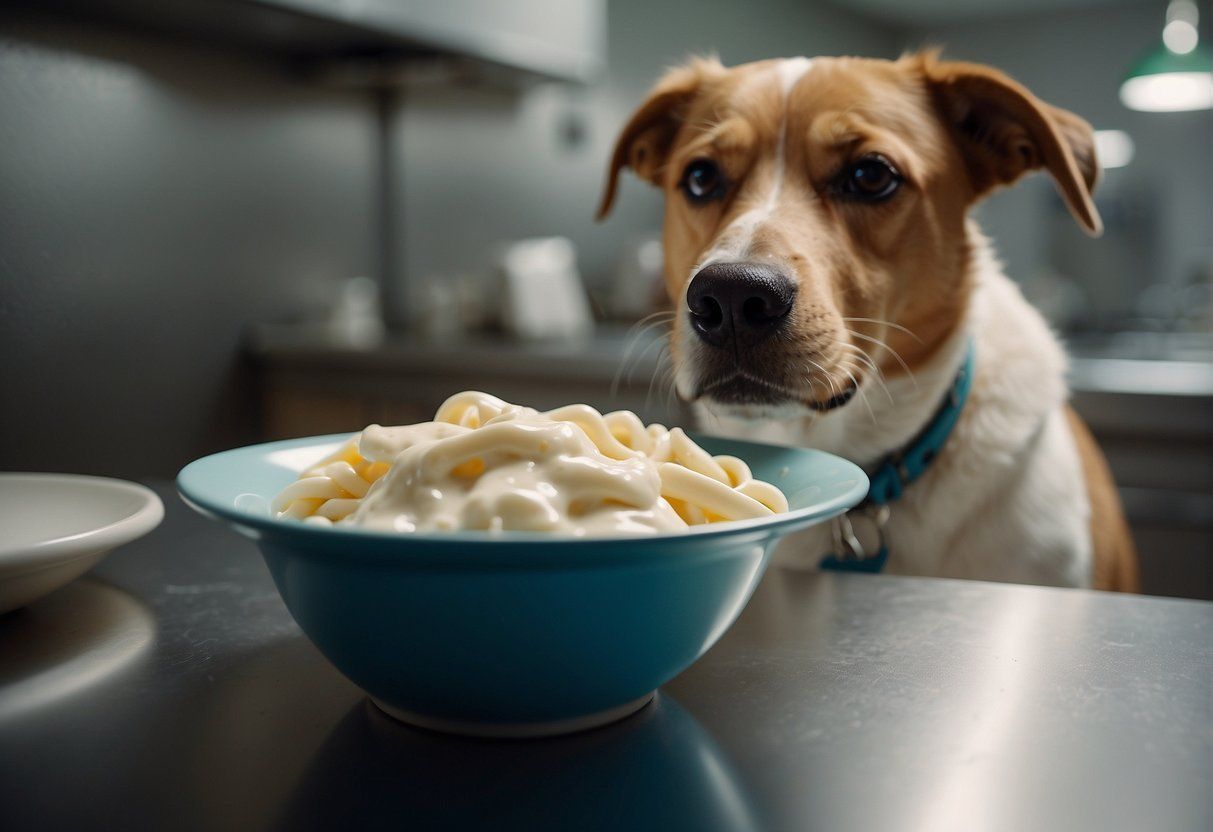Can Dogs Eat Alfredo Sauce? Vet-Verified
Can Dogs Eat Alfredo Sauce? Vet-Verified

Vet Reviewed

By: Sarah Hodgson
March 4, 2024
- Posted in Dogs
Table of Contents
Alfredo sauce, a rich creamy pasta topping prized by many, is a staple in Italian cuisine. Its classic preparation involves heavy cream, butter, parmesan cheese, and often garlic. While it is a delicious addition to a human's meal, the question of whether it is safe for dogs is crucial for pet owners. In this article, we'll go over whether alfredo sauce is safe for dogs.
Let's dive in!
What’s in Alfredo Sauce?
Alfredo sauce is a rich, creamy sauce typically used in Italian-American cuisine. It consists of several key ingredients that give it a distinctive taste and texture:
- Butter: Adds a smooth, velvety foundation to the sauce.
- Heavy Cream: Provides a rich and creamy consistency.
- Parmesan Cheese: Infuses the sauce with a sharp, cheesy flavor.
- Garlic: Offers a mild, slightly spicy kick to the taste profile.
While these are the core components, some variations of Alfredo sauce may contain additional ingredients like salt, pepper, and herbs for extra flavor. It's also common for cookbooks and restaurants to modify the basic Alfredo recipe, sometimes adding ingredients such as garlic powder or other cheeses.

Understanding Lactose Intolerance in Dogs
Lactose intolerance in dogs occurs when they are unable to properly digest lactose, a sugar found in milk and dairy products. Unlike some humans, many dogs lack sufficient levels of lactase, an enzyme that breaks down lactose in the digestive system. When lactose is not appropriately digested, it can lead to various gastrointestinal symptoms.
Symptoms of Lactose Intolerance in Dogs:
- Diarrhea: Loose stools are a common sign that a dog may be lactose intolerant.
- Abdominal Discomfort: Dogs may exhibit signs of pain or discomfort such as whining or bloating.
- Gas: Excess gas or flatulence may occur.
- Nausea: In some cases, dogs might vomit due to the ingestion of dairy products.
Recognizing these symptoms early on is crucial for the wellbeing of a lactose intolerant canine.
How to Handle Lactose Intolerance:
- Dietary Adjustments: It is recommended to avoid giving lactose-containing products to lactose intolerant dogs.
- Paying Attention to Labels: Some processed foods may contain dairy or lactose. Careful label reading is essential.
- Consulting a Veterinarian: If a dog shows signs of lactose intolerance, a veterinarian can provide guidance on managing the condition.
Can Dogs Eat Alfredo Sauce?
No. Alfredo sauce is not suitable for dogs due to ingredients that could pose serious health risks to canines. The main ingredients that pose a risk are onions and garlic which can be extremely harmful to dogs.
Potential Health Risks
- Dairy Products: Alfredo sauce's high dairy content from ingredients like heavy cream, butter, and parmesan cheese can lead to digestive upset in dogs.
- Garlic and Onions: Even in small quantities, garlic and onions are toxic to dogs and can cause hemolytic anemia.
- High Fat and Salt Content: The fat and salt in Alfredo sauce can increase the risk of obesity and heart issues in dogs.
Nutritional Considerations
- Lactose Intolerance: Many dogs are lactose intolerant and lack the enzyme to properly digest dairy products found in Alfredo sauce.
- Empty Calories: Offering dogs Alfredo sauce provides no nutritional benefits, as it chiefly supplies calories from fats.
What Will Happen If My Dog Ate Alfredo Sauce?
If a dog consumes Alfredo sauce, several health issues may arise due to its ingredients, which are not suitable for canine consumption. The following points outline the potential reactions a dog might have to ingesting Alfredo sauce:
- Pancreatitis: Rich in saturated fats, Alfredo sauce can trigger pancreatitis, an inflammation of the pancreas. This condition is particularly dangerous and can range from mild discomfort to life-threatening.
- Toxicity from Alliums: Alfredo sauce often contains garlic and onions, members of the Allium family, which are toxic to dogs. Even in small amounts, these can cause oxidative damage to red blood cells, leading to anemia.
- Gastrointestinal Distress: Dogs may experience digestive upset, including vomiting and diarrhea, due to high-fat content and dairy ingredients that many dogs find difficult to digest.
Symptoms to Watch For:
- Lethargy
- Abdominal pain
- Loss of appetite
- Vomiting
- Diarrhea
- Increased thirst
- Urinary issues
Should a dog display any of these symptoms, it's crucial to consult with a veterinarian. Early intervention is key to managing any adverse effects from consuming Alfredo sauce and preventing potential complications. The vet may recommend dietary changes, medication, or further diagnostic tests to assess the dog's health and guide proper treatment.

What Do I Do If My Dog Ate Alfredo Sauce?
If a dog ingests Alfredo sauce, immediate attention to their health is vital due to the potential toxic ingredients in the sauce. Here are the steps a pet owner should take:
- Identify How Much Was Consumed: Quantify the amount of Alfredo sauce the dog has eaten to determine the potential level of toxicity.
- Observe for Symptoms: Watch for signs of digestive upset, such as vomiting or diarrhea. Also be aware of more serious symptoms such as lethargy, abdominal pain, or difficulty breathing, which indicate a more severe response to the toxic ingredients like garlic.
- Contact a Veterinarian: If any symptoms appear or if it is known that the dog consumed a large quantity of Alfredo sauce, contacting a vet is crucial. Provide the vet with information about the amount ingested and any symptoms observed.
- Follow Professional Advice: The veterinarian may advise specific at-home care or recommend bringing the dog in for examination and treatment.
- Induce Vomiting: Only if directed by a veterinarian, inducing vomiting might be suggested. This should never be done without professional guidance, as it can cause additional harm.
- Prevent Future Access: Ensure that Alfredo sauce and similar foods are kept out of the dog's reach to prevent future incidents.
Remember, Alfredo sauce contains ingredients like garlic and high levels of dairy and fats that are harmful to dogs. It's best to avoid feeding dogs any human foods containing these substances.
Safe Alternatives to Alfredo Sauce
When considering treats for dogs, one should provide options that ensure their health and safety. It's important to avoid high-fat, dairy-rich foods like Alfredo sauce, and instead, offer healthier alternatives.
- Carrots: They are low in calories and high in fiber and vitamins.
- Green Beans: No salt added, these are a healthy and crunchy treat.
- Sweet Potatoes: A good source of dietary fiber, baked or boiled but not seasoned.
- Chicken: Cooked and unseasoned, can be added to their regular food.
- Turkey: Avoid skin and bones, and ensure it's not seasoned.
- Brown Rice: A great source of complex carbohydrates.
- Oats: Cooked without sugar or flavorings.
- Apples: Without seeds or core, as they contain vitamins A and C.
- Blueberries: Antioxidant-rich and suitable for dogs in small quantities.
Always introduce new foods gradually and in small amounts to monitor for any adverse reactions. It is advisable to consult a vet before making significant changes to a dog’s diet.
When to Consult Your Vet
When it comes to feeding Alfredo sauce to dogs, it's crucial to know when to seek professional advice. Dog owners should consult their veterinarian in the following scenarios:
- If a dog accidentally consumes Alfredo sauce: Promptly contact a vet if your dog ingests Alfredo sauce, especially in large quantities, due to its potentially toxic ingredients.
- Pre-existing health issues: For dogs with health concerns such as lactose intolerance, pancreatitis, or dietary sensitivities, a veterinarian should be consulted before altering their diet.
- Signs of Allium toxicity: If a dog displays symptoms like vomiting, diarrhea, lethargy, or abdominal pain, which may indicate garlic or onion poisoning, seek veterinary care immediately.
- Change in behavior or appetite: Following the consumption of foods containing dairy or high-fat content like Alfredo sauce, any unusual changes in behavior or lack of appetite warrant a veterinary visit.
Exposure to Alfredo sauce can pose a risk to a dog's health, so informed and timely decisions are imperative to ensure their well-being. Should any concerns or symptoms arise, contacting a veterinarian is the safest course of action.
The Bottom Line
So there you have it, Dogs should not consume Alfredo sauce. Its composition poses several health risks to canines. Your pet's health should be your top priority. Keeping your pet safe and healthy is the most important thing.

Subscribe to Petfluence!
Get updates on the latest posts and more from Petfluence straight to your inbox.